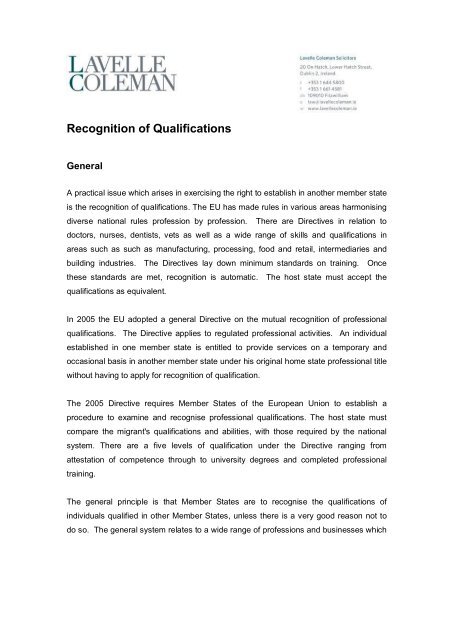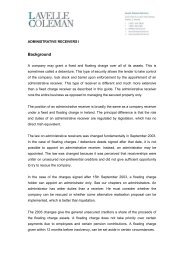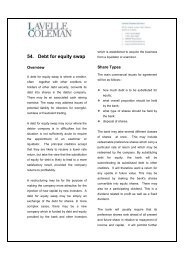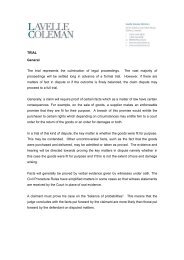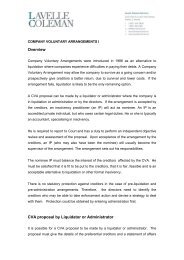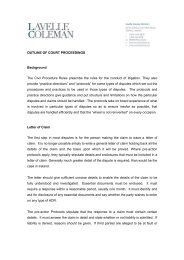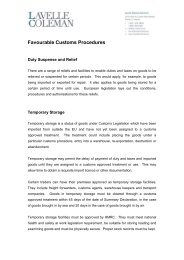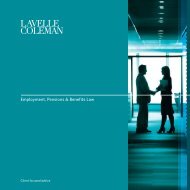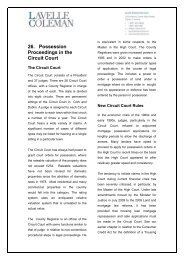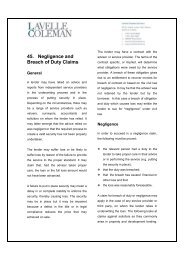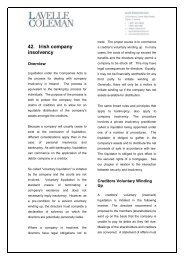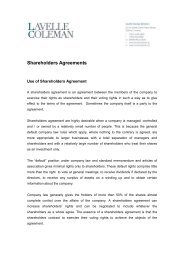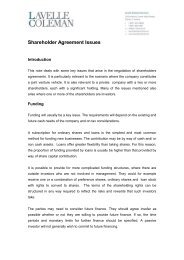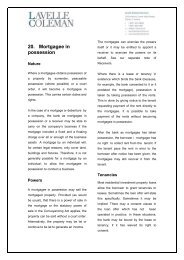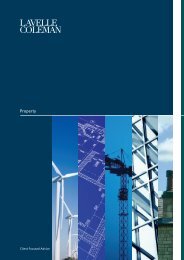Recognition of Qualifications - Lavelle Coleman
Recognition of Qualifications - Lavelle Coleman
Recognition of Qualifications - Lavelle Coleman
Create successful ePaper yourself
Turn your PDF publications into a flip-book with our unique Google optimized e-Paper software.
<strong>Recognition</strong> <strong>of</strong> <strong>Qualifications</strong><br />
General<br />
A practical issue which arises in exercising the right to establish in another member state<br />
is the recognition <strong>of</strong> qualifications. The EU has made rules in various areas harmonising<br />
diverse national rules pr<strong>of</strong>ession by pr<strong>of</strong>ession. There are Directives in relation to<br />
doctors, nurses, dentists, vets as well as a wide range <strong>of</strong> skills and qualifications in<br />
areas such as such as manufacturing, processing, food and retail, intermediaries and<br />
building industries. The Directives lay down minimum standards on training. Once<br />
these standards are met, recognition is automatic. The host state must accept the<br />
qualifications as equivalent.<br />
In 2005 the EU adopted a general Directive on the mutual recognition <strong>of</strong> pr<strong>of</strong>essional<br />
qualifications. The Directive applies to regulated pr<strong>of</strong>essional activities. An individual<br />
established in one member state is entitled to provide services on a temporary and<br />
occasional basis in another member state under his original home state pr<strong>of</strong>essional title<br />
without having to apply for recognition <strong>of</strong> qualification.<br />
The 2005 Directive requires Member States <strong>of</strong> the European Union to establish a<br />
procedure to examine and recognise pr<strong>of</strong>essional qualifications. The host state must<br />
compare the migrant's qualifications and abilities, with those required by the national<br />
system. There are a five levels <strong>of</strong> qualification under the Directive ranging from<br />
attestation <strong>of</strong> competence through to university degrees and completed pr<strong>of</strong>essional<br />
training.<br />
The general principle is that Member States are to recognise the qualifications <strong>of</strong><br />
individuals qualified in other Member States, unless there is a very good reason not to<br />
do so. The general system relates to a wide range <strong>of</strong> pr<strong>of</strong>essions and businesses which
are regulated.<br />
There is automatic recognition <strong>of</strong> qualifications for doctors, nurses,<br />
dentists, vets, midwives, pharmacists and architects.<br />
The 2005 Directive is aimed at both the freedom to provide services and the freedom <strong>of</strong><br />
establishment. The freedom to provide services would arise where services are provided<br />
cross border. Freedom <strong>of</strong> establishment arises where a branch or subsidiary is formed<br />
in the host country.<br />
Nationals <strong>of</strong> EU Member States can provide services on temporary location basis in<br />
another States under their original pr<strong>of</strong>essional title without having to apply for<br />
recognition <strong>of</strong> qualifications. If they relocate outside the Member State <strong>of</strong> establishment<br />
in order to provide the service, they must provide evidence <strong>of</strong> two years pr<strong>of</strong>essional<br />
experience if the pr<strong>of</strong>ession in question is not regulated in that Member State.<br />
States’ Obligations and Rights<br />
A regulated pr<strong>of</strong>ession is one where access to it, is regulated and subject to specific<br />
qualifications. Each Member State must provide and update information on its regulated<br />
pr<strong>of</strong>essions for the benefit <strong>of</strong> outside applicants and must designate a contact point<br />
within its administration. Training requirements have been harmonised and there is<br />
automatic recognition <strong>of</strong> pr<strong>of</strong>essional qualifications. There are special rules for lawyers<br />
providing services and establishing in other Member States.<br />
If the comparison reveals that the holder has knowledge and qualifications identical or,<br />
at least, equivalent to the national qualification, the host state is obliged to recognise the<br />
qualification. If the comparison reveals the applicant only partly fulfils the necessary<br />
qualifications, the host member state can require compensatory tests or training to<br />
demonstrate he has acquired the relevant knowledge and qualifications.
The EU member states are obliged to give reasons for decisions in the area <strong>of</strong> mutual<br />
recognition <strong>of</strong> qualifications, so that European Commission and in the event <strong>of</strong> a dispute,<br />
the European Courts, can verify their compatibility with European law.<br />
If the service provider relocates into the host state in order to provide services on a<br />
temporary or occasional basis, he or she must provide evidence <strong>of</strong> two years<br />
pr<strong>of</strong>essional experience in the home state if the activity is not regulated in their home<br />
state.<br />
The Directive allows the authorities in the host state to require the service provider to<br />
make a declaration prior to providing services and renew it annually including details <strong>of</strong><br />
insurance cover. It can require the first application to be accompanied by certain<br />
documents such as pro<strong>of</strong> <strong>of</strong> nationality, legal establishment and home pr<strong>of</strong>essional<br />
qualifications.<br />
Systems <strong>of</strong> <strong>Recognition</strong> <strong>of</strong> <strong>Qualifications</strong><br />
There are three systems for the mutual recognition <strong>of</strong> qualifications. The general system<br />
<strong>of</strong> recognition applies on a fall back basis to all pr<strong>of</strong>essions not covered by specific rules<br />
on recognition. Where access to a pr<strong>of</strong>ession is regulated in the host state (i.e. subject<br />
to requirements for qualifications) the regulatory body in the host state must allow pursuit<br />
<strong>of</strong> the pr<strong>of</strong>ession under the same conditions as for nationals, provided the applicant<br />
holds qualifications obtained in the home member state which shows a level <strong>of</strong> training<br />
at least equivalent to the level required in the host state.<br />
The host state may make recognition <strong>of</strong> the qualification subject to the applicant<br />
completing compensatory measures. Aptitude tests or adaptation periods <strong>of</strong> up to three<br />
years may be required if the training is one year shorter than that required in the host<br />
state, if the training received covers substantially different matters from that in the host<br />
state, or if the pr<strong>of</strong>ession in the host state comprises one or more regulated pr<strong>of</strong>essional<br />
activities which do not exist in the corresponding pr<strong>of</strong>ession in the applicant's home state
and the difference consists <strong>of</strong> specific training which covers substantially different<br />
matters than those completed by the migrant. The host state must generally <strong>of</strong>fer the<br />
applicant a choice between adaptation test and an aptitude test.<br />
Under the second approach, there is a system <strong>of</strong> automatic recognition <strong>of</strong> qualifications<br />
attested by pr<strong>of</strong>essional experience. This approach applies to certain industrial craft and<br />
commercial activities. The automatic recognition <strong>of</strong> qualifications is attested by<br />
pr<strong>of</strong>essional experience provided that conditions <strong>of</strong> duration and the form <strong>of</strong> pr<strong>of</strong>essional<br />
experience are met.<br />
The third system <strong>of</strong> recognition comprises automatic recognition <strong>of</strong> qualifications for<br />
specified pr<strong>of</strong>essions. Minimum training conditions are prescribed which cover<br />
pr<strong>of</strong>essions <strong>of</strong> doctor, nurses, those responsible for general care, dentists, dental<br />
practitioners, vets, midwives, pharmacists and architects.<br />
Procedures for <strong>Recognition</strong><br />
The host Member State may require that the service provider makes a declaration prior<br />
to providing any services and renews it annually. The host country may also require that<br />
the application be accompanied by certain documents listed in the Directive such as<br />
pro<strong>of</strong> <strong>of</strong> nationality, legal establishment and pr<strong>of</strong>essional qualification.<br />
If the host Member State requires registration with a pr<strong>of</strong>essional association, this must<br />
occur automatically once the relevant authority receives a declaration with the<br />
applicants file. For pr<strong>of</strong>essionals with health or safety implications the host Member<br />
State may carry out a prior check <strong>of</strong> the service providers pr<strong>of</strong>essional qualifications.<br />
In cases where services are provided under the pr<strong>of</strong>essional qualification <strong>of</strong> the Member<br />
State <strong>of</strong> establishment, the regulatory authority in the host State may require service<br />
providers to furnish the recipient <strong>of</strong> the service with certain information including<br />
information regarding insurance cover and pr<strong>of</strong>essional liabilities.
The authorities in Member States are required to exchange information necessary for<br />
complaints by a recipient <strong>of</strong> a service against the service provider to be pursued. The<br />
host Member State can ask the Member State <strong>of</strong> establishment for information regarding<br />
a service provider's legal status and freedom from penalties.<br />
___________________________________________________________________<br />
This Guide is intended as an overview and broad outline <strong>of</strong> the matters covered in it. Its purpose is to inform<br />
and raise awareness. We are happy to <strong>of</strong>fer specific legal advice on particular circumstances. This Guide<br />
should not be relied on as a substitute for comprehensive legal advice with reference to the particular<br />
circumstances.<br />
While we have taken care in the preparation <strong>of</strong> this publication, we do not accept legal liability as a<br />
result <strong>of</strong> any reliance placed on anything in this Guide. The reader should rely only on specific legal or<br />
taxation advice.<br />
© Paul McMahon <strong>Lavelle</strong> <strong>Coleman</strong> 2009


